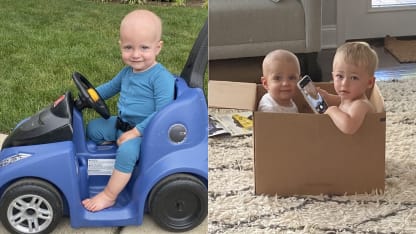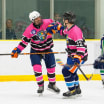As part of Hockey Fights Cancer month, NHL.com will profile people in the game who have been impacted by cancer. Today, former NHL defenseman Kyle Quincey and wife Rachel share the story of their 1-year-old son, Axl, who had surgery to remove a cancerous brain tumor in June.
Quincey grateful 1-year-old son recovering from surgery for brain tumor
Former NHL defenseman, wife say seeing child happy again is 'our greatest blessing'
Quincey family on fight against ependymoma
Rachel and
Kyle Quincey
believed it was a routine visit to the emergency room, maybe a stomach bug, maybe the flu. It was late March, in the early stages of the coronavirus pandemic, and they wanted to make sure their son Axl was OK. He had been hit with a high fever, with vomiting.
But it wasn't the flu, and he was sent home to rest, to recover. He didn't.
The projectile vomiting remained, and Rachel and Kyle, a defenseman who played 13 seasons in the NHL, searched for answers for weeks, until they found themselves at Children's Hospital Colorado, where Axl had a CT scan.
"That's when we discovered the mass," Rachel said.
It was days before his first birthday.
"That first night, the nurse came in and she had a mask on because the pandemic was just starting, but you could kind of read her eyes and you could tell it wasn't good," Kyle said.
Axl went into emergency surgery April 2 to alleviate a blockage of spinal fluid. That surgery led to a diagnosis of a Grade III anaplastic ependymoma, an aggressive cancerous tumor that was wrapping around his brain stem and vital nerves.
That was eight months ago. Since then, the Quinceys -- Rachel, Kyle, Axl and his brother Stone, who is 2 and a half -- have been through surgeries and chemotherapy, radiation treatments and a move from Colorado to Philadelphia for three months for treatment. They have felt the embrace of the hockey community, including the literal embrace of Philadelphia Flyers goalie Brian Elliott, who hosted them for the summer, and the pain of the unknown. Axl's family has seen him confined to a hospital bed and under anesthesia, watched him get up and learn everything all over again, and celebrated, starting the Team Ax Foundation to raise awareness to increase funding for pediatric cancer research.
"Right now, we're just so happy," Kyle said. "He's a little boy again."
\\\\
While Rachel and Kyle are talking over Zoom, Axl stands in front of them, playing with a Batman figure, a piano, some blocks. He is calm, patient, wandering off occasionally to find another toy. His hair is growing back from chemotherapy, and though he might not be as sure on his feet as some other 19-month-olds, there is little to outwardly betray what he has been through.
"Right away it's the new normal," Kyle said of the day Axl was diagnosed in April. "It's the cards you were dealt, and you deal with them. There's no other option. You have all these feelings inside you, but the most important thing was just, take care of him."
After that first surgery, the next step would be two induction rounds of chemotherapy to help the second surgeon, this time at Children's Hospital of Philadelphia, remove the tumor without interfering with his nerves or brain stem, and then the surgery would be followed by 30 radiation treatments.
It's here, during this explanation, that Rachel tears up, her hand going to her heart and then to Axl's head.
"It's just amazing to see him as he is right now," she said. "Because at the time you just don't know. You hope. But to see how well he's doing right now and how happy he is, is our greatest blessing."
The Quinceys knew this was not guaranteed.
On June 8, Dr. Phillip Storm, CHOP's chief of neurosurgery, began a 22 1/2-hour surgery in an attempt to remove every bit of the tumor, every microscopic cell. Rachel and Kyle didn't see their son for 30 hours as they waited and hoped, and slept fitfully on a cement floor.
But even after it was over, after they were reunited in the pediatric intensive care unit, there was more waiting to be done, for the tubes to be removed, for his swelling to calm down, for a glimpse of their boy to emerge.
"The one thing you don't think about, but all the nerves that they were worried about … they control your face and your eyes and your nose and your mouth," Kyle said. "He was so swollen shut that we had to wait a couple days to see his eyes open on his own, to see that he could move his mouth, that he could smile. It might have been a week before the first time we saw him smile."
Axl needed 30 proton radiation treatments after the second surgery, with the radiation targeted at his brain stem. That concluded in August, but the recovery did not.
The cancer had left him confined to a bed for long stretches, so he had to relearn how to sit up, how to pull up, how to walk. His balance was affected. He is still working on swallowing, after his right vocal cord was paralyzed during the first surgery, and most of his nutrition comes from a feeding tube in his stomach. He will need to be monitored by MRIs every few months for years.
But they see the confidence coming back, the daring. The Quinceys delight now, as he takes steps, as he walks across a room, as he tries to keep up with Stone, scenes familiar to all parents of budding toddlers, but to them a revelation each time.
They can breathe again.
"It's amazing how resilient kids are," Rachel said. "Every finger poke, every needle poke, he just handled everything so courageously and strong. He battled through it. He was doing things that I couldn't have done if I were sick."

\\\\
The Quinceys still marvel at the hockey community, at how it was there for them when they needed it most. When they opted for treatment in Philadelphia, a network of hockey wives started a group chat to help them find housing that included Amanda Elliott. Brian Elliott and Quincey had been teammates with the Colorado Avalanche in the 2010-11 season. It was not their only offer.
The family spent the summer in Philadelphia, returning to Colorado on Aug. 20.
"It's hard to explain the gratitude that we have for the Elliott family," said Kyle, who is retired from hockey after last playing in 2018-19 for HIFK Helsinki in Finland. "I cannot imagine being in a hotel room for three months going through what we were going through."
And now they're working to make life easier for others experiencing pediatric cancer. They know that not every family has the access and support they do. That not every family gets a treatment plan like they did.
That was why they started the Team Ax Foundation, helped by Haley Stastny, the wife of Winnipeg Jets center Paul Stastny, and have raised more than $32,000 through the sale of shirts featuring a koala riding a bicycle, chosen because after his first surgery, Axl would cling to his parents. He didn't want to be put down. He became their koala. And there, too, they felt the love of the hockey community.
"It's like, oh my God, the whole Columbus Blue Jackets bought a shirt," said Kyle, who played 20 games for the Blue Jackets in 2016-17. "It's awesome to see everybody come together. We're used to being part of a team and it just feels like we'll always be part of the hockey family."
And they want to share that.
"We founded the Team Ax Foundation on a mission to, No. 1, raise awareness, because we had no idea how underfunded pediatric cancer was until halfway through Axl's treatments," said Rachel, citing the fact that 4 percent of cancer research funds goes to pediatrics. "And it was just so alarming being parents to a child with cancer and not even being aware of how underfunded it was and slowly starting to learn the stats and the facts and how frustrating it is that the money isn't allocated differently. You just assume that the kids are being looked after."
The foundation will work on reallocating those funds, as well as supporting initiatives like the Children's Brain Tumor Network, which aims to share data from samples of brain tumors across the medical community.
That is what they hope will be the lasting effect of Axl's experience, that they're able to spread some of what they were given as they went through the unimaginable difficulties of the past eight months, and what they continue to go through.
That, and being able to see Axl's smile.
"He has the best smile," Rachel said. "His smile can light up a room, and it's something that you're so grateful, every single time, for] his smile. Because we knew there was a risk in the surgery that he would lose control of his smile. And that's what I look forward to every morning, when I see him, is his smile."
To learn more about the Team Ax Foundation, please visit
[teamaxfoundation.org
.

















